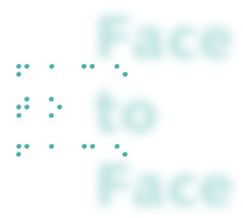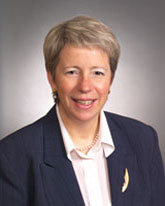
President of Retina International
Zürich
We all remember the moment when we or one of our loved ones was first diagnosed with the disease. I was only 13 years old when they told me I had retinitis pigmentosa (RP) (explanation). My parents were very open and tried to explain the extent of the disease to me, gently but without hiding the fact that one day this condition would leave me blind. Contrary to common expectations, this news did not really bother me at the time. The explanation of my night blindness as well as the fact that my field of vision had decreased to about 8 degrees helped me understand the many strange things that had been happening to me: I always wondered why other people could find things so quickly in the dark or why they didn't seem to have any problems catching a ball or jumping over an obstacle. The diagnosis somehow gave me a new freedom – I no longer had to play volleyball and other competitive games; games in which I could never fully participate and which embarrassed me each time none of the other children wanted to have me play on their team.
The first time I realized the impact of the disease on my personal life was when I was ready to choose a profession. My interests were in science or medicine, but being severely visually impaired these dreams were not to come true. Realizing that my future was not in my own hands sometimes made me frustrated and angry, and I kept asking myself: Why me? However, I was lucky to have grown up in a very supportive family who have a positive attitude towards the future. I decided to go into advertising where I gave my best and was successful. Since I had so-called tunnel vision and a very good central visual acuity, reading was not a problem for me and helped me continue to live my life as normally as possible. Driving was never an option and I sometimes missed the free mobility other young people normally enjoy. Since I had no other choice, I was open about my visual impairment, but I knew that my peers could never guess how severely impaired I really was. As we all learn to do, I invented a lot of different strategies to help me overcome or avoid uncomfortable or difficult situations.
RP causes a gradual loss of vision and the sight that you do have is never really stable. Depending on the lighting, you may see everything very clearly, if it is good but if it is bad, you may see nothing at all. This means that from one moment to the other, I had to perform first as a sighted person and then behave as a perfectly trained blind person. Looking back, I would describe this period of slow vision loss (about 15 years) as the most difficult time of my life. Being in this no-man's-land between the world of the sighted and the world of the blind was an enormous stress. I always believed what I saw at first sight, but soon came to realize that this was not always correct and that I could not necessarily trust my own eyes. This was especially difficult in social interaction: Family members and friends never knew when I actually needed help and when not. Today, I am completely blind and for both myself and others it is obvious when help is needed.
Although it might seem paradoxical, it was almost a relief when, 8 years ago at the age of 42, I finally lost my vision completely. At last I knew exactly where I stood. And, despite the pain of this loss, going blind can also have some interesting aspects. I am by nature a very visual person, and the fact that my brain still works with images despite the lack of visual input fascinates me. All the things that I had been able to see before now serve as precious treasures for my imagination. Going blind also meant that I had to explore my own limits and overcome my personal anxieties. I always hated being dependent on others and my wish for independence spurred on my will to quickly master the different rehabilitation techniques such as walking with a white cane as well as the simple tasks and skills one needs just to get through the day.
The two things I miss most of all though are not being able to see the expression on people's faces when I speak to them and the ability to read print. Being unable to see who is around means that I have to depend on others to approach me and start any social interaction that may take place. It has happened that I had attended an event and only realized later that people were there who I would have loved to meet again. I used to read everything that came into my hands. Now, even though a great number of books are available on tape or via talking computers, nothing can really compensate for the pleasure you get from visiting a book shop, taking a book in your hands, and browsing through the new books on the shelf. Still, I believe that there has never been as good a time as today to be blind: Technology is making immense progress. Computer technology, for example, has opened up totally new possibilities to acquire information independently. With the aids available 20 years ago, I would never have been able to work in such an interesting and rewarding profession as the one I am in today.
To be faced with an untreatable disease is difficult to cope with and each of us deals with it in different ways. For me it was the reason I decided to join the RP organization of my country 20 years ago and to take an active part in the fight for sight. Despite the fact that there is still no treatment available, I can see the difference between now and then: Today there is well-founded hope that this situation will change sooner or later. Through my work in the organization I have had the opportunity of getting to know many wonderful people – patients and researchers – who I would never have met otherwise. Should this be the deeper sense of my having RP? If so, what better reward could I get than friendship?

Christina Fasser
Retina International
Ausstellungsstrasse 36
CH–8005 Zürich (Switzerland)
| Tel.: | +41 1 444 10 77 |
| Fax: | +41 1 444 10 70 |
| E-mail: | cfasser@e-link.ch |
| Homepage: | www.retina-international.org |
>> next![]() Retina International
Retina International